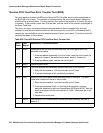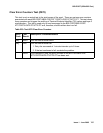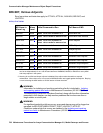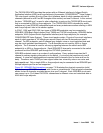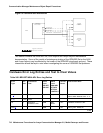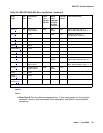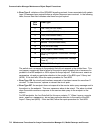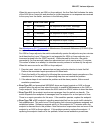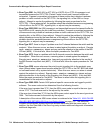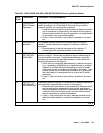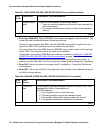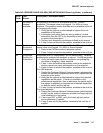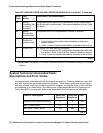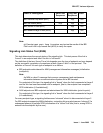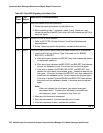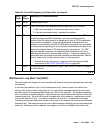
Communication Manager Maintenance-Object Repair Procedures
714 Maintenance Procedures for Avaya Communication Manager 3.0, Media Gateways and Servers
h. Error Type 2561: the ASAI-ADJ or ATT-ADJ or LGATE-AJ or ATTE-AJ message is not
transmitted because the PKT-CTRL (Packet Control circuit pack) transmit buffers are
exhausted. Frequent or persistent occurrence of these events may indicate a hardware
problem or traffic overload on the PKT-CTRL, the signaling link, or the ASAI or Avaya
adjunct. Attempt to resolve the problem by following the repair procedures for the
PKT-CTRL. If these attempts fail, the problem should be escalated because re-engineering
of the traffic on the PKT-CTRL, signaling link, or adjunct may be necessary.
i. Error Type 2562-2566: the ASAI message is not transmitted because the transmit buffer for
the ASAI link is full, causing the link to be flow controlled. Frequent or persistent occurrence
of these events may indicate a hardware problem or traffic overload on the PKT-CTRL, the
signaling link, or the ASAI or Avaya adjunct. Attempt to resolve the problem by following the
repair procedures issued by the manufacturer of the adjunct. If these attempts fail, the
problem should be escalated because re-engineering of the traffic on the PKT-CTRL,
signaling link, or adjunct may be necessary.
j. Error Type 2817: there is a layer-2 problem over the D channel between the switch and the
endpoint. When this error occurs, an alarm is raised against the station or adjunct. Execute
test station extension short and pay particular attention to the results of the BRI
XID test (#628). If this test fails, follow the repair procedure for Test #628.
k. Error Type 3073: there is a problem with the B-channel connection between the switch and
the endpoint. When this error occurs, a warning alarm is raised against the endpoint.
Execute test station extension long and pay particular attention to the results of
the BRI Remote Loop Back test (#627). If this test fails, follow the repair procedure for Test
#627.
l. Error Type 3329: occurs whenever the point-to-point signaling link to the endpoint goes
down (except when it goes down because either the PKT-CTRL or the PKT-BUS has failed
or has been busied out by system technician). When this error occurs, an alarm is raised
against the endpoint or adjunct. Execute test station extension short and pay
particular attention to the results of the Signaling Link Status test (#626). If this test fails,
follow the repair procedure for Test #626. The alarm is retired when the signaling link is
reestablished to the endpoint or adjunct.
m. Error Type 3585-3839: Certain ASAI protocol-specific cause codes are logged by switch
software. The cause code can be determined from the following formula:
If the error type is greater than 3712, then the ASAI cause code is equal to the error type
minus 3712. This code was sent to the adjunct by the switch.
If the error type is less than 3712, then the ASAI cause code is equal to the error type minus
3584. This code was sent to the switch by the adjunct.
A description of the various ASAI cause values is contained in the Table 241: ASAI CAUSE
VALUES; (BRI-SET/ASAI-ADJ Error Log Entries Notes) on page 715. This table also
contains recommended system technician actions associated with the cause value. In
addition, the Aux Data field of the Error Log entry contains additional diagnostic information
additional diagnostic.



